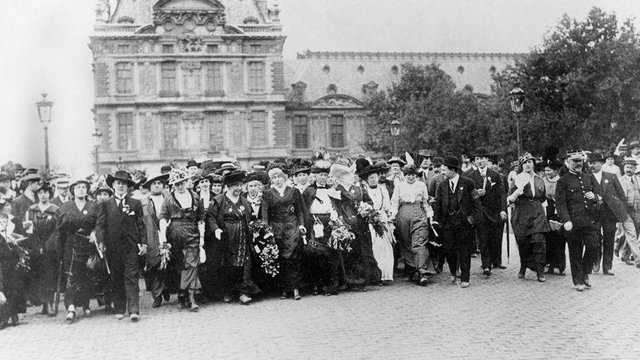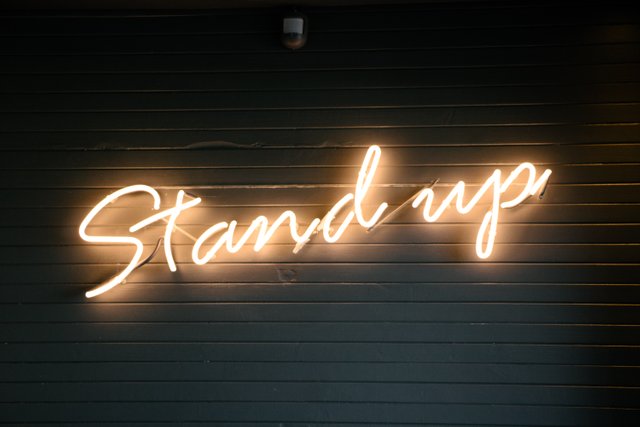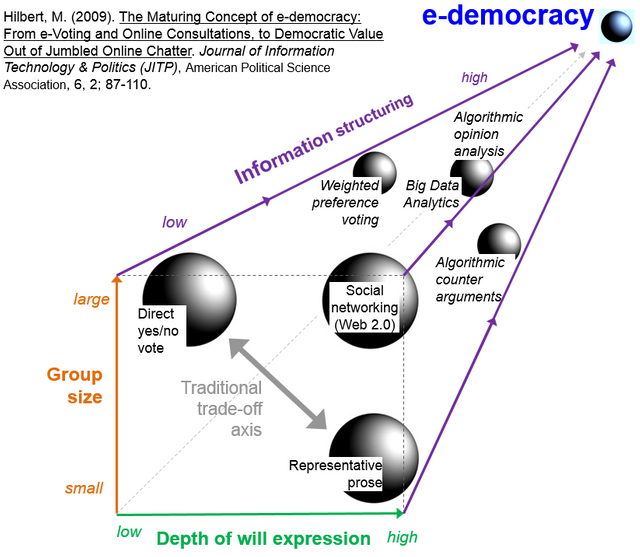Upgrading Democracy

This post is an elaboration of some of the ideas that I touched upon in my post about Freedom and Democracy which was written for a "freedom" quest round for the @ifc (Information Finding Championship).
Let me get this out of the way quickly, this is not a partisan post for the Left or the Right, I don’t believe I advocate for either. Instead, it is just a discussion piece for potential methods for upgrading our democratic system. Please read it before flaming!
However, I am more than interested in hearing opinions about what is possible to upgrade democracy. I’m personally not a fan of the dismantlement of government, for all their flaws, I really believe that the good outweighs the bad, but it is in our nature to place more importance in the faults and be unable to see the parts that work well!
Contents
- Status Quo
- Sortition
- Direct Democracy
- Epistocracy
- Final Thoughts
The Status Quo

Our current system of democratic representation is a system that really hasn’t had any significant changes since it’s conception way back in the mists of history. Essentially the basic idea of equal representation and access to the law of “eligible citizens” has remained the cornerstone of the democratic ideal.
Certain things have changed around the idea of what constitutes an “eligible citizen”, originally it was a restrictive definition that was more tied to one’s status in society rather than a true equality of people. The largest and of the most recent widening of the “eligible citizen” definition was the addition of the other 50 percent of the population to the electoral roll around 1915 with the Women’s Suffrage movement.
However, the basic concept of representation, in that we send a duly elected representative to represent the wishes of a block of the population to a Parliament (or Congress if you want to be different) hasn’t really changed since the modern re-conception of the representative democracy.
“Many forms of Government have been tried, and will be tried in this world of sin and woe. No one pretends that democracy is perfect or all-wise. Indeed it has been said that democracy is the worst form of Government except for all those other forms that have been tried from time to time.…”
So, if we take this quote at face value, why is it that so many of us feel disenfranchised by the current system? Is there no other alternative?
I know there are many that would advocate the dismantling of government completely, however, I would argue this would be at best naïve and idealistic, and at worst a power vacuum that would be filled by something worse.
However, I do think that it is way past time for certain upgrades to democracy. I have written about three ideas (Sortition, Direct Democracy and Epistocracy) that might be potentially interesting, however, as with all things of this scale, there is always danger of unintended consequences.
Or as the famous proverb goes: “The road to hell is paved with good intentions”.
Sortition (Random representation)

In our current form of representation, it would be a stretch to say that our elected representatives are actually a representative cross-section of the population as a whole. In fact, you would think that it would be relatively easy to have a representation of somewhere close to 50 percent of women, however, around a century after they were granted the duty of voting in elections, we are still nowhere close to that sort of representation. This is not only restricted to the representation problem of gender, but also representation of different social classes and life experiences.
Sortition is the idea that the Parliament (or part of it) is represented by citizens chosen via random selection for a set period of time. Sort of like an enhanced form of jury duty, where it is a citizen’s duty to the State to represent fellow citizens on matters of policy generation and review.
Is it important to have a representative cross section of the population?

There are some who might argue that that it is not really necessary to have a completely representative cross section of the community, or that perhaps it is actually better to have only “those who know best” to be allowed to direct decision making. Possibly, but I would argue that the lack of real representation leads to laws and policies that are defined by the narrow experiences of those in the policy/political bubble, thus leading to a chasm between what is considered to be the public good by the legislators and what is considered appropriate by the public itself.
The pool of potential representatives are currently limited by two major factors, wealth and in part education. This is not a good thing for true equality and representation.
If there was (in a two house democracy) a house of review (like the Australian/American Senate or the English House of Lords) that was comprised of citizens that were fulfilling their democratic duty as a citizen (like jury duty), we might achieve a better outcome and alignment between public policy and public sentiment. In addition, we could achieve better public ownership of legislation as something that is developed publicly by members of the public rather than imposed by lawmakers.
Solution to corruption?

This could be an added bonus that is inherently built into the random selection. The Western world is quick to point the finger at corruption in other countries (and rightfully so), however, if we take a quick introspective look at our own systems of governance, there is no guarantee that corruption cannot be found breeding in our own system. Power inheritance and long tenures of representation are in fact systems that are incredibly prone to corruption and the idea that Western democracies can somehow shield themselves from this is naïve. In the United States, the emergence of political dynasties is an abomination that encourages power concentration at best and corruption at worst. Also, we have seen in other Western democracies, that length of political public service can easily lead to behind the scenes corruption.
Can this really work?
Yes, there have been studies showing that randomly selected people with no specific knowledge of law making and policy can come together and produce results that are viable and worthy. Our current Parliamentary representatives are not experts in their policy fields anyway, however, with able and fearless advice and information from our public servants they are able to come to fairly reasonable and non-disasterous (if perhaps non-representative) policy outcomes.
Futher reading on Sortition
Accidental Politicians: How Randomly Selected Legislators Can Improve Parliament Efficiency
The Peter principle revisited: A computational study
Democracy Through Multi-Body Sortition: Athenian Lessons for the Modern Day
Cryptographically Enabled Direct Democracy

Direct Democracy
Direct Democracy targets the problem of the highly coarse grained nature of our current representative democracy. Our current democracy involves us choosing representatives to represent a block of population once every 3 or 4 years. So, the time scale is quite large which doesn’t allow for fast changes of support (if the candidate/party is not upholding the values you thought they would) and the population block is also large (thus leaving a large percentage of the population block as “unrepresented”. In addition, even those who voted for the winning candidate would not likely back 100 percent the entire party platform of the candidate, thus leaving more people feeling “under-represented”.
This system of representation made a lot of sense in the days when communication and travel were slower. However, now we have the option for every citizen in a democracy to directly vote upon every policy decision that is brought before the Parliament in real time. Of course, to do this would be too much to ask for every member of the citizenry, so it would also be necessary to have the ability to delegate voting authority to another person (representative) or party, which in the extreme case would just devolve back to the current form of representation. However, a better level of fine graining could be implemented with the ability to choose different delegates for different policy areas (one person for environment and a different for economy). Also, the ability to change delegate or dis-endorse your delegate could be done in real-time.
The sudden rise of cryptographic blockchains has perhaps laid the basis for a version of this sort of governance. Steemit itself is a proto-version of this, we all have the ability to vote or retract our support for witnesses and or delegate our votes to a proxy if we wish, and all in real time.. In addition, the fact that we have 30 votes allows us to further fine grain our wishes for the future policy direction of the platform. However, like I said, it is a proto-version….
A worse situation?
“…which bases its claim to rule upon numbers, not upon rightness or excellence"
Direct democracy has not been tested on a large scale, and at its heart lies one glaring defect. It is a system that is especially prone to the idea of The Tyranny of the Majority. In this modern era, we have come to expect that all view are equal and that the casual layperson has equal authority as an expert. In fact, we have come to a point where even the term “expert” is used as a negative accusation.
In a direct democracy, if we had a fully educated and analytically critical population that was versed in all policy fields and was not subjected to distorted information then perhaps we could avoid this trap. However, given that this is an ideal and not at all achievable then perhaps this could be a case of the cure being worse than the malady itself.
Further reading on Direct Democracy
Electronic Direct Democracy
Direct Democracy
Epistocracy

The concept of Epistocracy, or the restriction of voting rights to the politically or civically informed is an interesting upgrade, however , like Direct Democracy, one that could have large unintended consequences. It also strikes at the heart of whether you think voting is a duty of the citizen or a privilege that needs to be earned.
The basic idea is to prevent voting by the uninformed or by those who are not aware of how the civic structure and institutions work. This leads to the result that, in order to gain the right and privilege to vote, one must pass some certification or civic examination. One could argue, that we already do this for driving cars, and the responsibility of choosing of a government is at least as important as the responsibility of piloting a car safely!
The difficulty lies then in how the exam is structured. It would have to be a non-partisan exam to instead explored the workings of the Parliament and the Civic Institutions that protect our democracy, liberty and freedoms; in addition to how the system of voting actually works in each respective country.
Citizenship exams as an example?

All newcomers (to Australia at least) who wish to become citizens of Australia (with voting rights) are required to undergo a citizenship examination where they learn of the shared values and the workings of our democracy. If you were born in Australia, you were supposed to be taught these ideas at school, but it is quite surprising how many adults still do not understand how our system of elections (Compulsory and Preferential voting). Consider, that many of these civic courses would have been taught in Primary or Secondary school, and then think about what things that you were taught at that time that you still remember and understand clearly.
So, it is possible, that every 10 or so years, that a citizen (in order to retain or gain voting privileges) would have to resit the citizenship examination. In doing so, it could be an opportunity to educate the population at large about the workings of the Government, elections and their civic duties. In having a more rational, civically and politically informed voting population, maybe it would be possible to have a better more efficient Government that would instead have to rely on concrete policy outcomes to sway voters rather than fear and propaganda or sometimes thinly veiled bribery?
Less representation?
The glaring fault in this upgrade would be that it could result in even less representation. In countries where voting is compulsory, this idea would drastically reduce the population base of voters, however, the laws that would eventually be enacted would affect the whole population. In countries where voting is non-compulsory, there could be a bias in what types of classes are eligible to vote. Both these outcomes would result in a greater part of the population feeling disenfranchised.
Further reading
Should we desire an epistocracy of the informed and rational?
My Final Thoughts
The system that we have now is stale and ripe for change. Long term power dynamics have grown in what used to be dynamic democracies, and this entrenching of power will (or has) led to complacency and, at worst, corruption. I still believe that a form of democracy is still the optimum solution, as it does take a middle ground approach between what I consider to be the disastrous extremes of centralised and completely decentralised power. I have explored a few ideas which I hope sparks a little bit of interest, however, as I have noted, each of them have potentially disastrous unintended consequences.
After much thinking about this topic, I would have to say I do find the appeal of Sortition (Random Selection) to be the most appealing upgrade. The other two, whilst having their merits, I feel have too much potential for a situation which is much worse than what we already have.
Thank you for reading if you made it this far! This post was intended to throw some ideas out into the Steemit ocean to see if other people had ideas that could further inform my thinking! Please let me know in the comments!

My musicoin artist page (tap on banner), come support your favourite music on the crypto-ecosystem!
One of the orchestras that I play in, specialising in Early Music. Click on the banner for the Steemit page, featuring music and various articles about music!
The classical music community at #classical-music and Discord.
Follow our community accounts @classical-music and @classical-radio.
Community Logo by ivan.atman

Proud member of the Alliance!
SteemBulls community Discord here
Horizontal Rulers by cryptosharon
Team Australia footer by bearone
.png)



Great topic for debate... but I shall have to come back :-)
for now...
Upvoted, resteemed and has been added to the latest MAP Upvotes post.
Thanks! It is an interesting area as more and more people feel that they are not well served by democracy, I fear that we will reach for alternatives that seem initially enticing but might be worse in the long run...
Yes, I sense your fears in the article. I'm less interested in systems - although my comment on abolishing corporations, which can legally be done by any territory, still holds. That won't stop the scum rising to the top - the action that is necessary is to stop that happening. I'm reading Political Ponerology, which is a great book on our psychopathic autocrats and how they avoid being medicated to oblivion.
[crap! kept getting 504 pages, now see 3 versions of this comment - shall delete!]
I don't want to, nor do I have time for a long winded debate right now and I haven't even responded to our conversation from like.. What seems like over 2 weeks ago now, so.. I'm just going to keep this really simple and short, and it may take me a while to get back to the response. But.. I wanted to ask you about this part.
What's good about government violence and force? And.. Which parts work so well by the way? Like.. For example.. What does government do so well, that regular people freely organizing without violent force, coercion and manipulation can't do?
I'm genuinely asking cause government is essentially violent control and force, behind every law is a government gun that will try to enslave you or even kill you if you disobey. So.. Where is violent force and government guns necessary where the free will of people would not suffice?
What can government do that's so "good", that regular people working together voluntarily can't do?
I have witnessed first-hand democracy that is actually a monarchy in effect because all the officials comes from one family and any attempt to dislodge them are met with Guns, Gold, and Goons.
The idea of the electoral college and Preferential voting although it sounds elitist but for me it makes sense because like in my countty most politicians win due to being popular because they were a movie star (Erap Estrada become the President once) a boxer (Manny Pacquio is a senator) and a clown (Fucking Tto "Plagiarist" Sotto is Senate President currently, Yeah I really hate this person)
Sortition looks like something that might work in conjunction with blockchain technology and smart contracts to lessen tampering.
Democracy can definitely be a thin veneer for other regimes, just saying something is a democracy doesn't make it one! However, I have to say I was writing from the point of view of someone whose experience of democracy is one that is bolstered by strong and independent civic institutions, (Australia and Netherlands). So, I had forgotten (in hindsight, obvious) that the word and concept of "democracy" might not have meant the same thing to all people!
Anyway, the American electoral college is a little strange and old-fashioned to me, the further abstraction of electing representatives to go and elect another representative is a little weird. Definitely something that was more appropriate for the horse-powered age.
Sortition (or epistocracy) is the most interesting concept to me from these three, as it has the most likely chance (haha) of producing a representative cross-section of the population. However, that does mean that the citizens have to be ready to stand up and do their duty to represent their fellow citizens, and if the experience of jury duty is any guide, this might prove to be a little tricky....
My travel experience has opened my eyes to what "freedom" and "democracy" can be. I believe the European system of Parliamentary Democracy suits my preferences and lifestyle better than the USA system as it exists today, especially under he who doesn't deserve to have his name mentioned out of pure vanity. Americans are brainwashed and don't realize it until they see other systems and lifestyles in action.
I have to agree, the American system of democracy has really gone slightly awry. I also prefer the European systems, but they do also have their flaws which some of these suggestions might go some way to remedying.
WOW that is a good post! I never loved democracy... I have my reasons but when I try to explain them, people call me names, bad names :) I am more of a Socrates fan than I am of Plato and yes I do agree with some (most) of S. philosophy. That being said and accepting that people do not accept that... I would be happy with democracy if a person received his right to vote after he/she took a mandatory exam. It is not fair that foreigners have to take the exam and people who live in a certain country do not. What happens is that all foreigners know what only a few natives know. I am gonna stop talking now... This is not a subject I like discussing :D Some people are sheep, democracy does not work PERIOD
Thanks for reading! I am curious about why you think democracy is flawed (I also see flaws, hence the post!), but I don't see a better alternative. I see well intentioned alternatives, but ones that seem to come with much more dangerous flaws. Anyway, I am really interested in what you consider the problems with democracy are, more than happy to receive a Discord DM (not looking for a debate!) if you don't want a public record!
About Plato and Socrates, I'm not well versed enough in philosophy (well, this sort of philosophy) to know what the difference is. I have a friend who is a Philosophy professor, probably I should ask him...
I wouldn't be so harsh about democracy, I would prefer to say that it currently doesn't work efficiently!
Today is Democracy Day in my country. There are certain loopholes in the democratic system. Still alot need to be done to improve the system.
The need to curb corruption and check out for abuse of power by political office holders.
Definitely, there are many implementations of democracy, of which many are only paying lip service to the ideals of a liberal democracy. Without strong civic institutions, it can just be a veneer of legitimacy to an authoritarian regime. Some of the suggestions in the post go part way to disrupting corruption.
Thanks for sharing this post. Learnt alot from it. Broaden my understanding of democracy.
Democracy is a system adopted by the modern world but it has been here since many centuries ago in history. One system that resembles this is the Muslim Caliphate where each authoritarian citizen of the empire would give (beya) a vote in order to choose the next Caliph.
That does sound interesting, however, I'm less keen on the idea of so much power vested in a single(?) person.
I've never really looked into this, but you definitely put in a lot of effort making this post. Thanks for sharing your opinion, I've definitely learned a lot from your post. Keep up the great work! :)
Thanks for reading! Glad you found some interesting ideas!
Personally my upgrade of democracy would be a switch to anarcho-capitalism. Good post though :)
Thank you!
It may be my flawed understanding of anarcho capitalism of maybe there are modifications to the base idea that I'm not aware of, but I think that this system of governance is well intentioned, but prone to long term flaws.
Addressing the capitalism part, without a regulatory 'bully' (government), competition alone is not enough to keep companies and corporations in check. The end goal of a unrestrained free market is monopoly or a collusion. I don't see it (competition) as a long term point of stability, it is temporarily stable, but it doesn't have the negative feedback loops to form a stable system.
The anarchic part, I think is great in theory and in the short term. However, I think it is not stable in the long term, as groups and power bases form over a long time . Thus, these groups begin to organise, and with this organisation comes a recentralisation. You cannot force decentralisation again, as they are free to organise in the first place. This, if you have centralisation of power, then I would prefer it was held in check and restrained by a system (such as representative democracy).
Again, please let me know if I have misunderstood what anarcho capitalism stands for! I really think it is a great idea, just unrealistic.
Those are good points. I'm a bit rusty on my own politics lol I wrote this about a year ago and it sums up exactly what I think: https://steemit.com/anarchism/@driptorchpress/what-s-this-about-a-nap
Thanks, I will definitely read it! I'm always wanting to know more about different things, especially if they aren't what I normally what comes into my mind!
Large scale democracy is a scam. It cannot and never will work. Grown ups should not look to other grown ups for permission to be grown ups. Period. Good post!
Thanks for reading!
I'm not entirely clear from your comment if it is democracy or government (or both) that you consider a scam. I agree that in an ideal world, adults should not be dictated to by other adults, however in any group larger than one, eventually one person or group will inevitably gain power over another.
In that case, I would prefer there is an accountable and restrained system of governance to prevent the excesses of that happening.
So, I think government is a way of stopping other groups imposing their will upon others, and that this power is restricted and held accountable by democracy and other civic institutions.